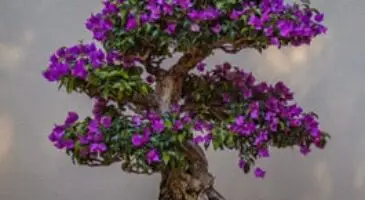Table of Contents
Growing a Bonsai tree may be one of the most tedious pastime activities one can have as a hobby due to certain care requirements that must be met. But some requirements are quite flexible, making the whole process simple looking at it from another angle.
One of these several requirements is the Bonsai placement: most Bonsai will do well as either an indoor or outdoor plant. In most cases, the temperature requirement of a Bonsai tree will determine its placement, meaning whether you are raising them as an indoor or outdoor plant, the temperature must not be too cold or hot; they won’t survive.
Since office buildings are always very cold, people do ask me, can a Bonsai tree live in an office? I have provided exhaustive answers to this question in this article.
Can a Bonsai tree survive in an office?
Yes, the Bonsai tree will survive in an office. At first, it is very normal to be skeptical about raising a Bonsai tree in an office because a lot of variables can work against them. However, you can plant just any Bonsai tree in your office only that you must know thoroughly the specific care required for that plant.
This is important so that you can supply them as it may be required for their survival. Nonetheless, it is worth stating that even though you can create the necessary atmosphere for any Bonsai to survive, the most suitable Bonsai for offices are indoor plants. Doing this will only be a few steps away from success.
Will a Bonsai tree grow in an office?
Yes, Bonsai trees will grow in an office. Both indoor and outdoor Bonsai will thrive in offices as long as they are provided with the necessary care (adequate water, sunlight, temperature, fertilizer, etc.) that are germane for their survival.
Just place them anywhere comfortable where they will not interfere with the office’s daily hustle and bustle.
Is Bonsai good for offices?
Yes, Bonsai is good for offices. Asides from beautifying your room, having Bonsai in your office will also change the ambience of your office by helping to create a relaxing and calm environment for your office.
Also, Bonsai trees are natural air purifiers, which can help naturally improve the quality of air circulating within your office. These are a few of the numerous benefits that make Bonsai trees suitable for offices.
Bonsai trees living conditions
The living conditions of Bonsai vary from plant to plant, so it would be best to first figure out the most suitable condition for a specific Bonsai species before going for them. While tropical Bonsai will survive when exposed to high temperatures year-round, that is not the case for subtropical Bonsai as they tend to lower temperatures more.
Generally, most Bonsai trees will benefit more when they are raised in a condition similar to the atmosphere in the wild, where they will be exposed to the four seasons.
Can Bonsai trees live outside the UK?
Yes, Bonsai trees can be grown as outdoor plants in the UK. You can grow all native British trees outdoors in the Uk. In fact, you can plant outdoor plants like the maple, pine, juniper, azalea, mulberry crab apple, wisteria, and so many others outside in the UK, just that you have to protect them when it gets extremely cold.
Do Bonsai trees do well indoors?
Yes, Bonsai trees will do well indoors. It is not a misconception that most Bonsai trees need the four seasonal changes to survive, but it is also true that indoor plants have also had equal chances of survival as their outdoor counterpart.
This is so true of both tropical and subtropical plants. These sets of plants have unique qualities that give them the ability to live indoor spaces known for stable year-round temperatures.
What Bonsai trees can be kept indoors?
1. Fiscus Bonsai
Fiscus is considered by many as the best Bonsai tree suitable for indoors. Thus the evergreen plant is cold and hardy and can survive low humidity and infrequent exposure to light than most others that will be mentioned later. There are lots of ficus species, but the most often planted indoors are Fiscus retusa and Fiscus Benjamina.
2. Carmona Bonsai
The Carmona Bonsai is popular for the small white flowers it blossom throughout the year and its red fruit. This evergreen plant will also make an excellent indoor plant as they are quite hardy. However, unlike the Ficus species, Carmona bonsai will require enough sunlight and must be taken outdoors sometimes, especially during summer.
3. Chinese Elm Bonsai
If you are new and you are looking for the ideal Bonsai to start with, look no further than the Chinese Elm Bonsai, as the tree can be easily trained, pruned, and most importantly, they are fast growers. Although those are excellent qualities, what makes Chinese Elm popular among house plant lovers is that it can be conveniently grown indoors.
4. Serissa Japonica Bonsai
Serissa japonica is a flowery plant known for the beautiful white flowers it produces during spring and summer.
However, it is best to switch the placement of this plant between indoor and outdoor as they can be very sensitive to temperature changes, water, and light. Thus, they will still make excellent indoor plants if they are properly cared for.
5. Schefflera Bonsai
Schefflera Bonsai can be readily identified with its growth that mimics a canopy and its tiny trunks. Just like Fiscus, this plant can also survive low humidity and minimum light, making it an ideal indoor plant.
Where should Bonsai trees be kept?
Ideally, most Bonsai trees will grow well when they are exposed to the 4 seasons, so the best answer in this regard would be outdoor. However, a tree’s tolerance level or temperature requirement also plays a major role in determining its placement. While some plants enjoy direct sunlight, some prefer shade.
Therefore, it will be best to, first of all, determine the temperature requirement for a specific plant species before deciding whether to raise them as an indoor or outdoor plant.



